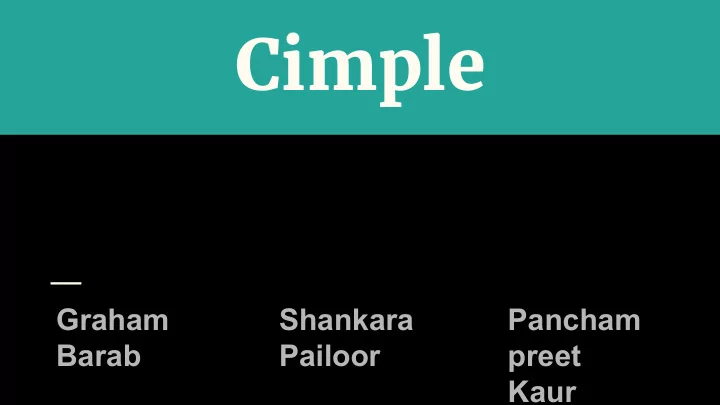

Cimple Graham Shankara Pancham Barab Pailoor preet Kaur
Motivation Struggles of a C programmer ❏ No Code-Reuse, except standard library; With Inheritance, Cimple to the rescue. ❏ Resource Management - all the malloc , calloc , realloc , free take away from the real problem; Cimple’s approach bi -dimensional - make or clean . ❏ Coding style – limited scope for compactness, readability, memory- efficient code; Cimple gives Anonymous functions , unnamed hence need no storage .
Comparison Features C Cimple Speed ✔ ✔ Programming Style Imp mperat rative ive Imp mperat rative ive, OO Library Support ✔ Pointers ✔ ✔ Inheritance ✔ Anonymous functions ✔ Interfaces ✔ Garbage Collection Manua ual l & Manua ual l but Cumbersom rsome Convenie nvenient nt
Inheritance ❏ Inheritance in Cimple modeled after Java ❏ Inheriting struct ‘extends’ another struct
Interfaces ❏ Allow more flexible inheritance than rigid parent-child hierarchy ❏ Define a contract for behavior of ‘implementing’ structs, using Method Sets Cimple Syntax Compiled C syntax
Methods Describes behavior of structs Example:
Anonymous Functions ❏ Introduced as a measure to make long programs better readable ❏ Syntax : Declaration :- func (return- type)(arg_1, arg_2, …) { statements } Call :- r-type outer-function(arg_1, func(return- type)(arg_1, arg_2, …) *func_pointer, ...){ // statements func_pointer(arg_1); // rest of the function body }
Anonymous Functions
Anonymous Functions int main(int argc, string **argv) { struct Person *graham; Struct grahamsName = “Graham Barab”; graham = make Person(func(string) { return grahamsName;}); printf(“Person’s name is %s”, graham.name); return 0; }
Heap Memory Management ❏ Handled using two keywords - make and clean ❏ make invokes the constructor, clean invokes the destructor
Architecture
Recommend
More recommend